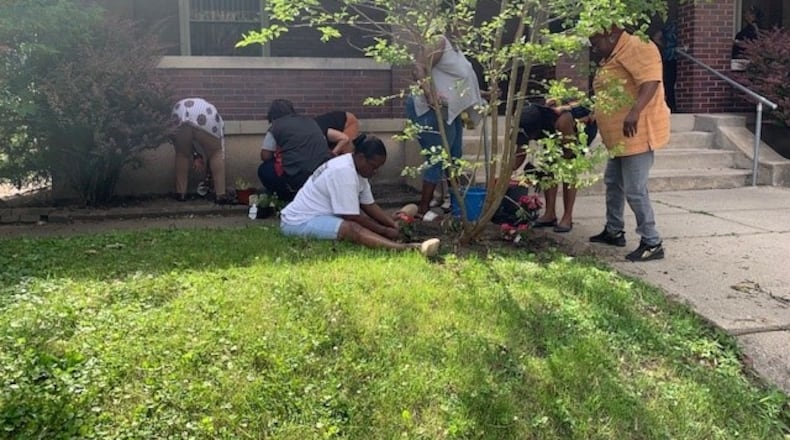Mercy Manor provides an intense 24/7, safe, spiritual recovery residence for women with histories of homelessness, abuse, mental health, incarceration, alcohol and drug addiction. “At Mercy Manor, the women work their program, while they re-establish themselves into the local community,” explains CEO Barbara Hudson-Benner. “Our targeted population is focused on females with dual diagnosis of mental health and addiction. The residents of Mercy Manor are the wives, mothers, and sisters of families in our community. Our intake of clients come from referrals from community addiction facilities, behavioral health facilities, drug court, criminal justice facilities, and other agencies where the client is seriously seeking to maintain recovery.”
Hudson-Banner says the women are provided with a structured program and hope. “The residents participate in developmental programming, which will enable them to help them become self-sufficient through personal growth, education, skill development and/or employment,” she says. “The length of stay is determined by the resident’s needs, progress, and willingness to abide by the recovery house rules, "
Hudson-Benner says the social model approach emphasizes interaction among residents in a shared living space and the surrounding community. Since the program’s beginning in 1992, more than 300 women have been served. According to Hudson-Benner 70 percent of these women have established safe housing, remained clean and sober, and are employed or enrolled in a secondary institution or a training program.
Pandemic presents added challenges
The COVID-19 pandemic presented a unique challenge to an organization that prioritizes peer interaction, peer support and participation in 12-step programs. “We had to function with essential virus mitigation standards that mandated awareness, such as adhering to social distancing, limited attendance in public places, and wearing masks,” says Hudson-Banner. “Health and safety have required Mercy Manor to move forward with virus mitigation procedures the best way we could to concurrently maintain a strong social model environment. "
She says there was also a substantial challenge with the inability to have the organization’s annual fundraiser. In addition, funders have also been challenged due to the pandemic, which has decreased their ability to support Mercy Manor as they have in the past. In some cases, their funds were redirected to the pandemic.
Here’s what they need:
- Tall kitchen trash bags
- Paper products such as toilet tissue, paper towels, napkins, facial tissues
- Liquid hand soap, liquid dish detergent, automatic dishwasher detergent
- Furniture polish
- Laundry detergent
- Lysol, Pine-Sol or equivalent,
- Window cleaner, Comet, Soft Scrub
- Personal hygiene products: soap, body wash, shampoo, conditioner, deodorant, body lotion, Vaseline, toothpaste, tooth brushes, hair spray.
- Alarm clocks, clock radios, umbrellas, postage stamps for personal correspondence, batteries of all sizes for personal CD players or cameras or radios, etc.;
Women going to Independent Living Apartments:
- Floor and table lamps, light bulbs, mops, brooms, scrub buckets, trash cans for kitchen or bathroom
- Furniture including kitchen tables, dining room furniture, beds, dressers, coffee tables, desks chairs, sofas, washers and dryers, etc.
- Rugs for kitchen or bathroom, bath mats, shower curtains
- Coffee makers, toaster ovens, pots, pans, dishes, glasses, flatware, televisions, DVD players, etc.
- Kroger, Meijer Gift Cards for food for new residents
Drop off your donations at 23 Grosvenor Ave., Dayton, Ohio 45417. You’re asked to call ahead to schedule a drop-off time. The number to call is 937-268-0282.
Mercy Manor is a service provider for the Montgomery County Alcohol, Drug & Mental Health Services (ADAMHS Board).
Other ways to help:
- An annual Charity Golf Tournament is scheduled for 9 a.m. Friday, July 29 at Meadowbrook Golf Club, 6001 Salem Ave., Clayton. The golf fee is $100 per person and sponsorships are available.
- A Founders Day Luncheon will be held on Saturday, March 18, 2023 at the Presidential Banquet Center.
- Speakers are available for group presentations or additional information. Call Barbara Hudson-Banner at 937-268-0282 or 937-554-2239. Website: Mercy Manor|homelesswomen|addiction|abuse.
MAKE A DIFFERENCE
Meredith Moss writes about Dayton-area nonprofit organizations and their specific needs. If your group has a wish list it would like to share with our readers, contact Meredith: meredith.moss@coxinc.com.
Please include a daytime phone number and a photo that reflects your group’s mission.
Credit: Contributed
Credit: Contributed
About the Author



